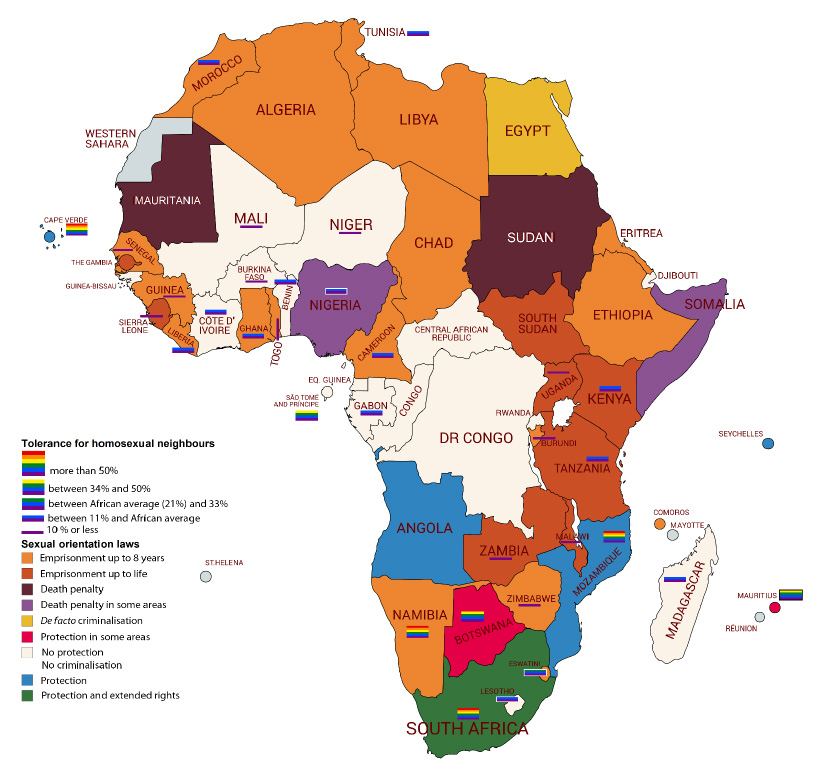Despite increasing recognition of gender diversity across the globe, most developing nations in sub-Saharan Africa continue to criminalize LGBTQ+ and transgender people. Limited data, societal stigma, and multiple legal barriers are leading to human rights abuses and societal rejection. The recent cuts by the U.S. and EU countries to foreign aid intended for diversity and inclusion programs are likely to worsen the situation. Exploring the challenges of LGBTQ+, specifically transgender people, is important in order to understand the human rights situation and the need for social justice in developing African nations.
At least 46 countries on the African continent have adopted draconian laws and policies against LGBTQ+ people. In 25 out of 46 sub-Saharan African nations, transgender sexual identity is illegal, with some nations imposing the death penalty for LGBTQ+ people. With no official statistics to frame the number of transgender and LGBTQ+ living on the continent, it is difficult to estimate the effect of these harsh laws. Furthermore, the issue is a considerable threat to communities, as they become marginalized and divided.
Legal discrimination of LGBTQ+ and transgender individuals in Africa
The legal invisibility of transgender people in sub-Saharan Africa is among the most challenging yet ignored human rights issues in the region. Despite the increasing global recognition of gender diversity, most legal bodies in Africa ignore and even criminalize transgender identities, allowing no legal platform for gender acknowledgment.
Outdated laws and policies are limiting transgender people’s access to legal recognition as well as subjecting them to discrimination in healthcare accessibility, education, and employment opportunities.
With punitive laws and policies in place against LGBTQ+ groups, the initiatives to create inclusive and resilient communities across the continent are being undermined.
According to a map of tolerance levels for LGBTQ+ and the legal framework governing sexual orientation in Africa, only three countries offer some protection and extended rights to these categories of people. The map, prepared in 2019 by the International Lesbian, Gay, Bisexual, Trans and Intersex Association (ILGA), also suggests that in many countries the level of tolerance for homosexual neighbors is less than the African average of 21%.
An African Map of Sexual Orientation Laws and Tolerance for LGBTQ+ in 2019

Source: The International Lesbian, Gay, Bisexual, Trans and Intersex Association(ILGA) 2019 Report.
According to a 2020 report by the same organization – the ILGA , same-sex marriage is criminalized in 25 of the 46 sub-Saharan African nations. In some of these nations, such as Nigeria’s 12 northern provinces, the death penalty is legally allowed for consensual same-sex sexual acts.
In Uganda, parliament passed the Anti-Homosexuality Act of 2023, while in Ghana, parliament plans to pass anti-LBGTQ+ laws. Meanwhile, authorities in Kenya are working on a ‘Family Protection Bill of 2023’, which will contain measures that limit the fundamental rights of transgender people.
Discrimination and societal stigma of transgender people in sub-Saharan Africa
Transgender people are among the most marginalized social entities worldwide, experiencing discrimination and ill-treatment. In sub-Saharan Africa, people in this category experience a serious level of discrimination by facing stigma, particularly in the healthcare sector. Confidentiality and privacy issues within existing systems, as well as the attitude of healthcare workers, reflect the struggles these individuals face. According to research, transgender individuals also struggle to attain formal employment and encounter expulsions from schools.
According to a 2025 research, LGBTQ+ participants feel misunderstood and unsupported by healthcare staff during HIV testing and counseling sessions. Most of the research participants felt that healthcare staff lacked the prerequisite skills and competencies to meet the unique health needs.
According to other research, legal limitations and increased costs deter access to gender-supportive healthcare. This research, conducted in 2024, shows that Africa’s transgender and gender diverse (TGD) individuals face challenges in accessing culturally competent and quality healthcare due to systemic and structural issues.
Advocacy actions for protecting LGBTQ+ rights
International development organizations and human rights advocacy groups are encouraging the legal recognition of LGBTQ+ in various sub-Saharan African nations. The United Nations Development Programme (UNDP) is implementing the #WeBelongAfrica: Inclusive Governance Program to evaluate LGBTI+ inclusion and human rights protection.
The U.S. President’s Emergency Plan for AIDS Relief (PEPFAR) is also an important tool in addressing the multiple problems faced by the LGBTQ+ population in Africa by facilitating HIV prevention.
The funding pool for human rights work had increased from almost $3 million in 2011 to almost $17 million in 2021, about $10 million of which was provided by the U.S. State Department. However, financial support offered by the U.S. to support diversity and human rights on the African continent was frozen in January 2025, after a decade of efforts.
Final thoughts
As the world marked the Transgender Day of Visibility on March 31, transgender people continue to struggle with legal recognition in sub-Saharan Africa, with the situation now becoming even worse. Their legal invisibility generates human rights violations and social injustices, which have an overall negative impact on societies.

